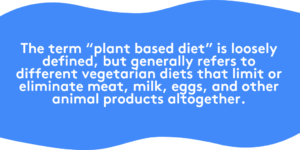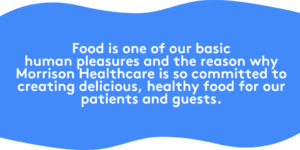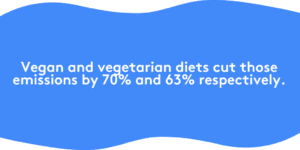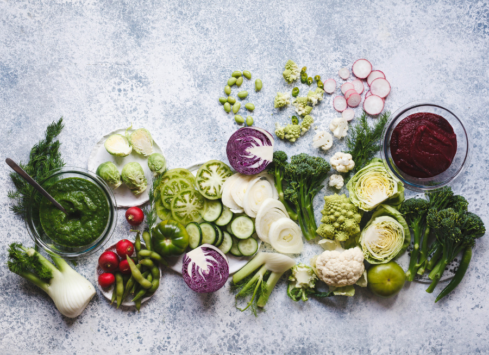An Intro to Plant Based Diets – Why are they so popular?
One of the buzziest current trends in self-care is adopting a “plant based diet,” which you might be tempted to write off as just another fad.
The possible benefits fans of a plant based or vegan diet rave about can seem far-fetched. Some who have adopted a plant based diet have experienced weight loss, all while eating more carbs. Beyond weight loss, people report experiencing higher energy levels, lower cholesterol, better digestion, lower rates of cancer and diabetes. Purchasing no meat or less meat has also helped many plant based and vegan eaters save money while contributing to a more sustainable planet.
Your skepticism is understandable but plant based and vegan diets are evidence-backed and attractive for a handful of reasons beyond even the many named above. So, let’s dig into what the experts say.
What is a Plant Based Diet?
The term “plant based diet” is loosely defined, but generally refers to different vegetarian diets that limit or eliminate meat, milk, eggs, and other animal products altogether. It is sometimes used interchangeably with “vegan,” a diet with no animal products at all, but is in some ways more flexible.

A strict vegan, for example, may avoid wearing leather or using beauty products tested on animals, out of concern for animal welfare. While commendable, a plant based diet is centered on the food and keeping mealtimes as clean and healthy as possible.
“A good example of this distinction would be Oreos,” explains Heather Farkas, Corporate Wellness and Sustainability Support Manager. “[They are] vegan, but not plant based.” In other words, an Oreo is vegan by definition (contains zero animal product), but is not considered healthy nor does it contain plants.
“We’re already seeing interest in plant based and vegan diets explode,” continues Heather. “The Physician’s Committee for Responsible Medicine (PCRM), a nonprofit that promotes ethical preventive medicine, reports that vegan diets rose in popularity by 600% between 2014 and 2017. There are 81.5 million #vegan posts on Instagram. Pizza Hut, which predicted that it would move 10,000 of their new vegan pizzas, ended up selling 28,000. [Compass Group] now reports that 60% of Americans ages 21 to 34 consume plant based meals.”
This surge in popularity isn’t just because of the proven health benefits or a new perception of flexibility. It’s also because vegetarianism has gone mainstream, which means more and better plant based options are available at your favorite restaurants, grocery stores, and Morrison Healthcare cafés.
“Taste matters,” says Heather. “Food is one of our basic human pleasures and the reason why Morrison Healthcare is so committed to creating delicious, healthy food for our patients and guests. Our plant forward recipes, like our Buddha Bowl, which can easily be prepared vegan, provide comfort as well as the necessary nutrients for healing. That’s the Power of Food!”

A Plant Based Diet Can Help You Manage A Healthy Weight
Many people are attracted to a plant based diet because it promises slow, steady weight normalization without hunger, frozen entrees, complicated mathematics, or the worry of immediately regaining the weight if you return to your old eating habits.
But does it really work?
Scores of studies say yes. Although plant based diets are usually high in carbohydrates, practitioners have a significantly lower BMI than meat-eaters.
According to a study of 60,903 Seventh Day Adventists, a health-conscious population with a high percentage of vegetarians and vegans, average BMI declines without the consumption of animal products. Omnivores averaged 28.8, lacto-ovo vegetarians (who eat milk and eggs, but no meat) 25.7, and vegans 23.6.
Other Health Benefits
Weight loss may be why most people begin a plant based diet, but there are myriad health benefits that make them lifelong practitioners.
“Within several months of starting a vegan diet, my LDL cholesterol (bad cholesterol) dropped 50 points!” exclaims Heather. “And because plant based and vegan diets include mostly vegetables, fruits, legumes, seeds, and whole grains, there is the added benefit of increased vitamins, minerals, antioxidants and phytochemicals….the primary characteristics of ‘superfoods.’”
“The Academy of Nutrition and Dietetics states that ‘appropriately planned vegetarian, including vegan, diets are healthful, nutritionally adequate, and may provide benefits in the prevention and treatment of certain diseases.”
Studies show that plant based diets provide relief from arteriosclerosis, hypertension, and cardiovascular disease, including stroke, dementia, and peripheral artery disease (PAD).
People who practice a plant based diet are also more resistant to Type II diabetes. In the same study of Adventists cited earlier, 7.6% of meat-eaters developed Type II Diabetes, while only 3.2% of lacto-ovo vegetarians and 2.9% of vegans did so.
Vegetarians and vegans also have a lower risk of cancer. A 2017 meta-analysis of 86 cross-sectional and 10 prospective cohort studies found that vegetarians had an 8% lower risk of developing cancer, while vegans had a 15% lower risk. Current research links meat, especially processed meat to an increased risk of certain cancers.
The mechanisms behind this are partially understood. A healthier BMI and adequate dietary fiber, as well as increased consumption of vegetables containing cancer-fighting phytochemicals such as sulforaphane, lycopene, and quercetin, seem to be key.
Will a Plant Based Diet Really Save the Planet?
It would certainly help. Livestock alone counted for more than 14% of global greenhouse gas emissions in 2016. We lose ten football fields’ worth of the Amazon rainforest per minute, just to cattle grazing—a problem that is mowing down other ancient forests and national parks all over the world.
Vegan and vegetarian diets cut those emissions by 70% and 63% respectively.

Then, there is the misery and antibiotic misuse in modern agribusiness. “The reason I am vegan is because I’m against factory farming,” says Heather. “It’s that’s simple. From the moment my son, Dominic, who was 11 years old at the time, showed me an undercover video of animal abuse in a factory farm, I decided that I would not participate.”
“That was ten years ago, when there was little discussion about cage-free, grass-fed, free-range, and so forth. I do believe responsible animal agriculture exists, but not enough to sustain our current demand for animal protein.”
Choosing a plant based diet relieves pressure on the farming industry to maximize production at the expense of animal health and welfare. It also saves water and energy. It takes 650 liters of water to grow a kilogram of corn, 43,000 to produce a kilo of factory-farmed beef. Free-range beef requires even more.
Theoretically, you could feed billions more people without opening up another acre of jungle or forest to farming—simply by adopting a plant based diet.
What are the Drawbacks?
You may be worried about a lack of energy, nutrients, or all of the very real FOMO you could experience at a dinner party. Heather has certainly experienced some of the social challenges that can come with choosing a plant based diet. However, most of these concerns – especially the ones related to nutrient deficiency – are unfounded.
Nutrients can be a concern. At first, lifelong meat-eaters may find it difficult to incorporate enough protein into their meals. While “fake meat” products are technically vegan, they are often very processed, and technically not plant based. Nevertheless, they may help you bridge the gap between your old habits and new, healthier lifestyle for a time.
Trying meat alternatives isn’t the only way to ween yourself off of meat though. Consumers have more options than ever (available at their fingertips – thanks, Siri!) to help in their journey toward a plant forward or vegan diet. There are countless websites dedicated to plant forward, protein-rich recipes that you can try as you transition your eating habits.
We do recommend a Vitamin B12 supplement, especially for vegans over 50. This is the one nutrient that your body cannot synthesize on its own and may not be available in vegan foods unless they have been fortified (i.e. many soy and nut milks, cereals, etc.). Other nutrients you may want to watch during your transition include iron, calcium, zinc, iodine, and Vitamin C.
You might want to consider enlisting a Registered Dietitian to help you properly plan your plant-based diet to ensure your body gets everything it needs.
Sounds Great! However, Where Do I Begin?
Quitting animal products cold tofurkey works for some people, but most of us need to ease into an entirely plant based lifestyle. You could begin your journey by participating in #MeatlessMondays, a global movement to introduce the world deliciously and easily to vegetarianism.
Giving up meat just one day each week can yield measurable health benefits, including weight loss and lower rates of diabetes, heart disease, and cancer. It also helps the planet. “According to one of Morrison’ Healthcare’s corporate partners, Practice Greenhealth, if all Americans eliminated meat for one day per week, it would reduce the carbon footprint the same as taking 19.2 million cars off the road for a year,” says Heather.
So, what are you waiting for? If you want even more evidence that plant based is the way to go, subscribe to the Power of Food blog, and be sure to check out our partners at the Physician’s Committee for Responsible Medicine.





